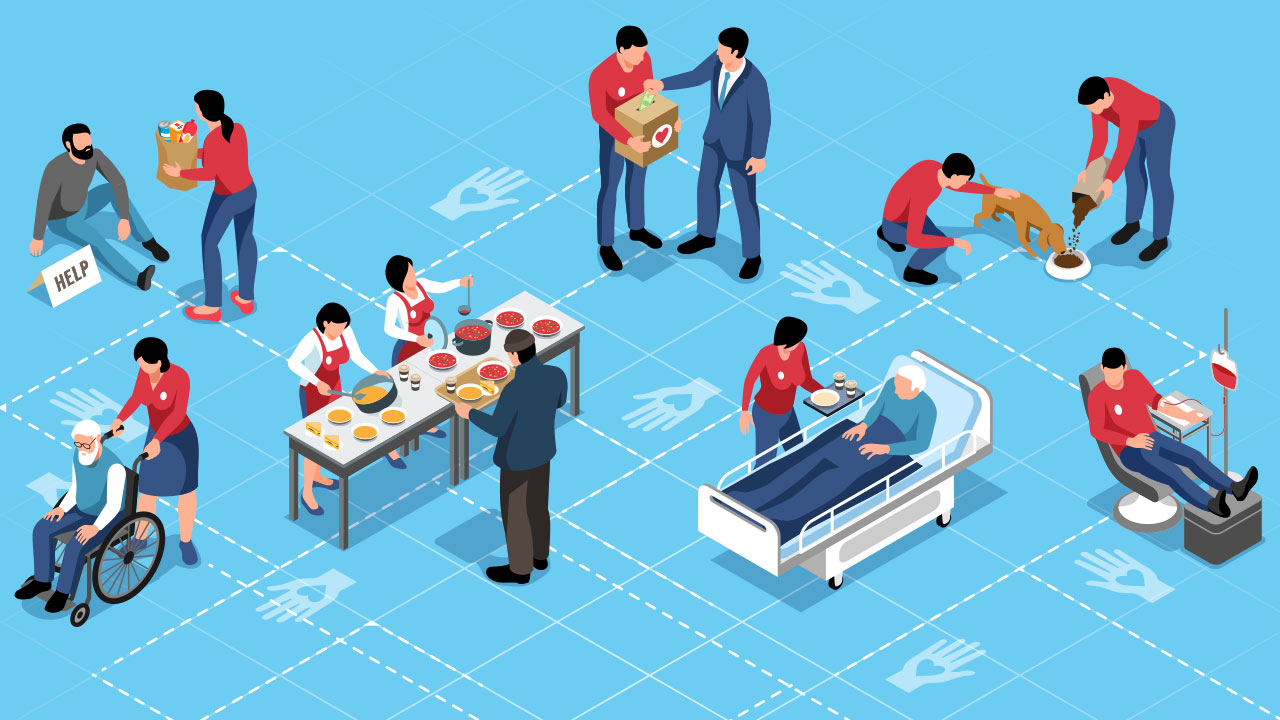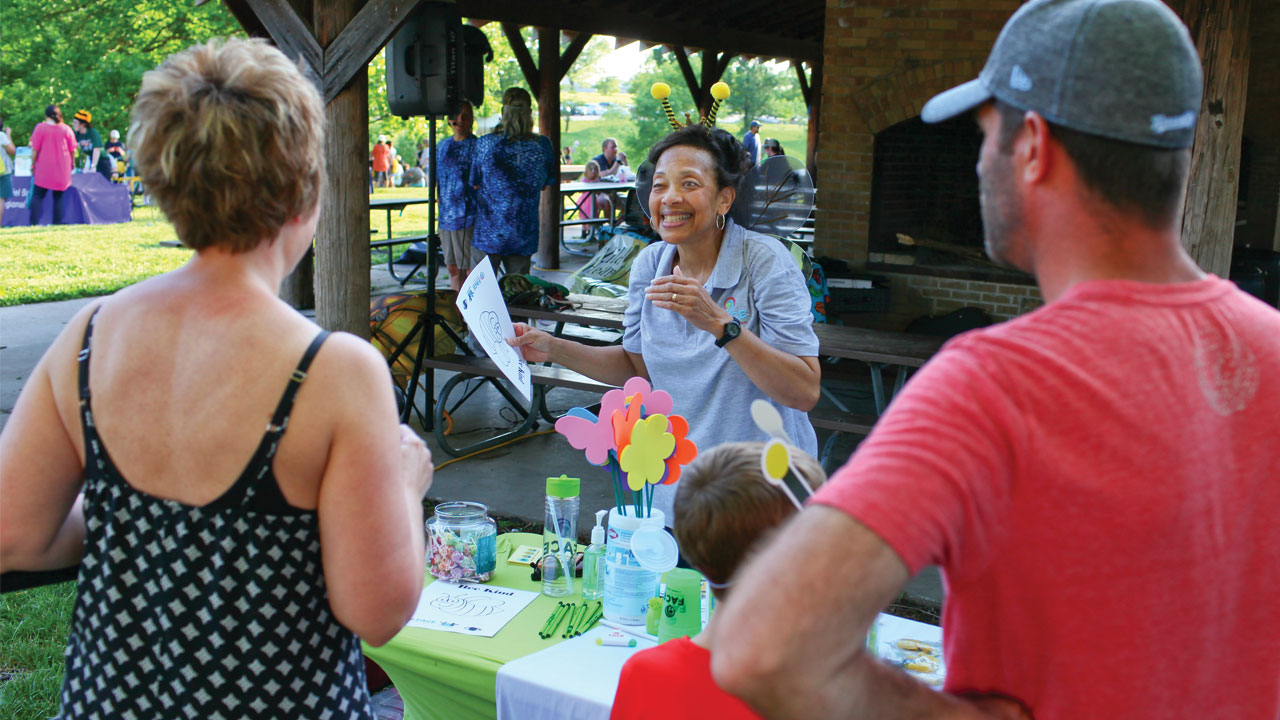
Published on Show Me Mizzou August 25, 2022
After overturning a school desk in a fit of anger, a sixth grader and his parents are referred to the Family Access Center of Excellence of Boone County.
A social worker living in a small town finishes work at a local hospital, eats dinner and then begins online studies toward a master’s degree in social work from MU.
Instead of toughing it out on his own, an unemployed young man who is too depressed to continue his job search receives free mental health counseling at the Integrative Behavioral Health Center.
All these situations — and hundreds more — show the MU School of Social Work plying its mission throughout mid-Missouri. “As a flagship organization, we are responsible for addressing the needs of Missourians,” says Aaron Thompson, who directs the school. “Teaching and research are essential aspects of our mission. But for social work, it’s important that we get out into the community and provide services for problems people are dealing with. The types of problems we confront today ultimately will be those of the future.”
The school tackles issues such as racism, discrimination and economic disparities through its innovative programs as well as by preparing the next generation of social workers to empower individuals and improve their quality of life.
Over the past 25 years, a body of research and new data-driven methods have made social work practice more accountable and effective. “The evidence-based model teaches our students not only to use assessment data to select the best scientifically supported approaches to alleviating a problem but also to build an evaluation cycle so they can understand whether their approach is working,” Thompson says.
Social workers play a key role at a critical time, and demand for their skills is on the rise. Why? An aging population depends on a range of services to maintain its quality of life; the opioid crisis continues to destroy lives, stress families and overburden local resources; and then there’s the pandemic. The human race has always suffered from depression and anxiety, but the pandemic has fueled a surge in mental health problems across age groups.
Here’s a look at what the school is doing now and where it is headed.
The Now
Long before the pandemic, a suite of programs in the school’s Family Access Center of Excellence (FACE) was reducing the local toll of social, emotional and behavioral problems. When COVID came along, the school responded quickly to social isolation, uncertainty and trauma. FACE provides no-cost clinical assessment and case management services, helping local children and families navigate a complex system of care to find the right programs and services that address their concerns and help them lead healthier and more fulfilling lives. It is funded by a Boone County Children’s Services Fund quarter-cent sales tax earmarked for mental health needs. Alongside faculty associated with the Missouri Prevention Science Institute, Thompson and other MU faculty guide FACE, hiring licensed professionals to staff the organization and training those staff and social work students in effective engagement, assessment and case-management practices.
Through FACE, the school also provides mental health training and consultation to other organizations, including 55 Boone County schools. FACE intervention specialists visit the schools, providing direct support services to students and teachers in need. This multilevel approach, which improves the social service infrastructure while serving the immediate needs of children and families, has earned widespread recognition. The National Association of Counties awarded Boone County and FACE a place on its distinguished listing of “100 Brilliant Ideas at Work.”

Even the best-designed programs for addressing mental health and behavioral problems rely on the public’s willingness to seek assistance. “Look Around Boone” is the school’s answer to diminishing the stigma of getting help. This public awareness campaign aims not only to change attitudes and encourage school-age children to accept their need for help but also to raise awareness that their friends might need support. The program targets students, teachers and parents with messages intended to eliminate the stigma of seeking services. “Our goal is to normalize the concept that everybody has troubles from time to time, and we want to make it easier to ask for help,” Thompson says.
To help uninsured or underinsured adults, the School of Social Work opened the Integrative Behavioral Health Clinic (IBHC), which provides free therapy to adults in need. Associate Professor Kelli Canada conceived the idea of IBHC and co-directs it with Assistant Clinical Professor Danielle Easter, a licensed clinical social worker. Operated by supervised graduate students, the clinic (see sidebar) also collaborates with other free health clinics at Mizzou.
Where to From Here
The School of Social Work has long built relationships beyond the confines of campus. In looking to the future, the school is extending its services and curriculum into small towns. “We are always searching for community leaders and organizations — especially in rural parts of the state — to partner with,” Thompson says. Students, working under the supervision of local professionals, benefit by gaining real-world experience at more than 300 community placement locations where they provide services to individuals in correctional institutions, the juvenile justice system, and health and mental health clinics. Such collaborations allow MU faculty and students to confront a range of issues that reduce individuals’ quality of life and harm communities. Faculty take an active role throughout mid-Missouri, not only serving as consultants to local social service organizations but also bringing the most up-to-date social science research to bear on local concerns.
The school is moving more of its courses online, offering the possibility of a career in social work to people who never considered it an option. Students can now earn a master’s degree in social work online, and the bachelor’s program could come next. “For instance, a young mom may be working at a local convenience store while taking community college online classes that count toward a bachelor’s degree in social work at MU,” Thompson says. “With that in hand, they can go on to build a social work career in their community.” People who already have a bachelor’s in social work can earn a master’s in an expedited manner through the school’s advanced-standing Master of Social Work program.
“Affordability is a big issue,” Thompson adds. Private agencies, foundations and individuals donate money to the school so it can reduce students’ financial barriers to pursuing a social work degree. “We’re continually developing scholarships that help fund students in rural areas.”
Since becoming part of the School of Health Professions in 2020, the School of Social Work has increased community-engagement opportunities for students, including practicums in health care settings. As society’s need for professionally trained and educated social workers grows, community engagement for students and faculty has never been more essential, Thompson says. “If someone is receiving a social service, they’re generally looking at a social worker.”



